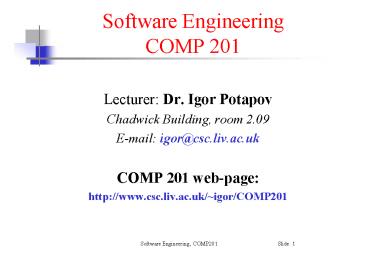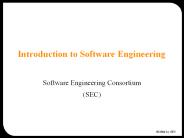Software Engineering COMP 201 - PowerPoint PPT Presentation
Title:
Software Engineering COMP 201
Description:
Software Engineering, COMP201 Slide 1. Software Engineering. COMP 201. Lecturer: Dr. Igor Potapov ... csc.liv.ac.uk/~igor/COMP201. Software Engineering, COMP201 ... – PowerPoint PPT presentation
Number of Views:88
Avg rating:3.0/5.0
Title: Software Engineering COMP 201
1
Software EngineeringCOMP 201
- Lecturer Dr. Igor Potapov
- Chadwick Building, room 2.09
- E-mail igor_at_csc.liv.ac.uk
- COMP 201 web-page
- http//www.csc.liv.ac.uk/igor/COMP201
2
Why Software Engineering?
- Software development is hard !
- Important to distinguish easy systems (one
developer, one user, experimental use only) from
hard systems (multiple developers, multiple
users, products) - Experience with easy systems is misleading
- One person techniques do not scale up
- Analogy with bridge building
- Over a stream easy, one person job
- Over River Severn ? (the techniques do
not scale)
3
Why Software Engineering ?
- The problem is complexity
- Many sources, but size is key
- UNIX contains 4 million lines of code
- Windows 2000 contains 108 lines of code
- Software engineering is about managing this
complexity.
4
Teaching method
- Series of 30-33 lectures ( 3hrs per week )
- Lecture Monday 12.00
- Lecture Wednesday 9.00
- Lecture Thursday 14.00
- Practical work (2 Assignments)
- ----------------------- Course Assessment
---------------------- - A two-hour examination 80
- Coursework 20
- --------------------------------------------------
---------------------
5
Recommended Course Textbooks
Sommerville Stevens Bundle
- Sommerville I. (2001,2004)
- Software Engineering
- 6th or 7th Edition, Addison-Wesley, Harlow,
Essex,UK - Stevens P. with Pooley, R. (2000)
- Using UML Software Engineering with Objects and
Components, - Addison-Wesley, Harlow, Essex, UK
- Introducing Asml (2001)
- Microsoft corporation ?
6
Outline Syllabus
- Introduction to Software Engineering
- Formal Specification using ASML
(Abstract State Machines
Language) - Software Design and Implementation
- Using the UML (Unified Modeling Language)
- Software verification, validation and testing
7
FAQs about software engineering
- What is
- software?
- software process?
- software engineering?
- software process model?
- What is software engineering?
- What is the difference
- between software engineering and computer
science? - between software engineering and system
engineering?
8
What is software?
- Computer programs and associated documentation
- Software products may be developed for a
particular customer or may be developed for a
general market - Software products may be
- Generic - developed to be sold to a range of
different customers - Bespoke (custom) - developed for a single
customer according to their specification
9
What is software engineering?
- Software engineering is an engineering discipline
which is concerned with all aspects of software
production - Software engineers should
- adopt a systematic and organised approach to
their work - use appropriate tools and techniques depending on
- the problem to be solved,
- the development constraints and
- the resources available
10
What is the difference between software
engineering and computer science?
Computer Science
Software Engineering
is concerned with
Computer science theories are currently
insufficient to act as a complete underpinning
for software engineering, BUT it is a foundation
for practical aspects of software engineering
11
What is the difference between software
engineering and system engineering?
- Software engineering is part of System
engineering - System engineering is concerned with all aspects
of computer-based systems development including - hardware,
- software and
- process engineering
- System engineers are involved in
- system specification,
- architectural design,
- integration and deployment
12
What is a software process?
- A set of activities whose goal is the development
or evolution of software - Generic activities in all software processes are
- Specification - what the system should do and its
development constraints - Development - production of the software system
- Validation - checking that the software is what
the customer wants - Evolution - changing the software in response to
changing demands
13
What is a software process model?
- A simplified representation of a software
process, presented from a specific perspective - Examples of process perspectives
- Workflow perspective represents inputs, outputs
and dependencies - Data-flow perspective represents data
transformation activities - Role/action perspective represents the
roles/activities of the people
involved in software process - Generic process models
- Waterfall
- Evolutionary development
- Formal transformation
- Integration from reusable components
14
What are the costs of software engineering?
- Roughly 60 of costs are development costs,
40 are testing costs. For custom software,
evolution costs often exceed development costs - Costs vary depending on the type of system being
developed and the requirements of system
attributes such as performance and system
reliability - Distribution of costs depends on the development
model that is used
15
What is CASE ? (Computer-Aided Software
Engineering)
Software systems which are intended to provide
automated support for software process
activities, such as requirements analysis, system
modelling, debugging and testing
- Upper-CASE
- Tools to support the early process activities
of requirements and design - Lower-CASE
- Tools to support later activities such as
programming, debugging and testing
16
What are the attributes of good software?
The software should deliver the required
functionality and performance to the user and
should be maintainable, dependable and usable
- Maintainability
- Software must evolve to meet changing needs
- Dependability
- Software must be trustworthy
- Efficiency
- Software should not make wasteful use of system
resources - Usability
- Software must be usable by the users for which it
was designed
17
What are the key challenges facing software
engineering?
- Software engineering in the 21st century faces
three key challenges - Legacy systems
- Old, valuable systems must be maintained and
updated - Heterogeneity
- Systems are distributed and include a mix of
hardware and software - Delivery
- There is increasing pressure
- for faster delivery of software
18
Next lecture
- Software Processes
- Wednesday 9.00 a.m.
- COMP 201 web-page
- http//www.csc.liv.ac.uk/igor/COMP201































